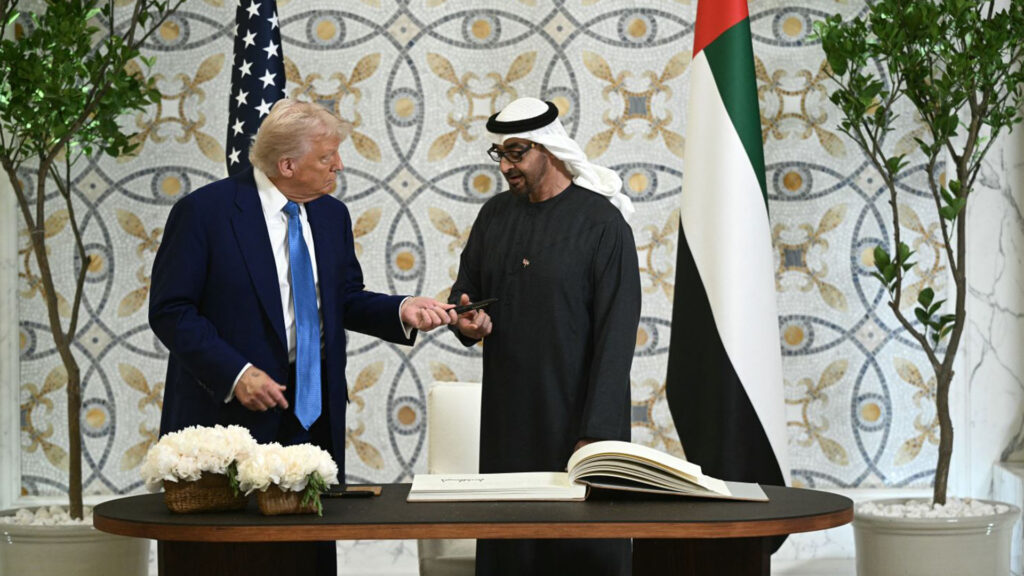
Newsletter Subscribe
Enter your email address below and subscribe to our newsletter

Enter your email address below and subscribe to our newsletter

In a landmark agreement signaling the United States’ renewed focus on international AI partnerships, President Donald Trump and UAE President Sheikh Mohamed bin Zayed al-Nahyan have unveiled ambitious plans to construct the largest artificial intelligence data center complex outside American borders.
The announcement came during Trump’s high-profile visit to Abu Dhabi, marking the third stop of his Gulf tour that has reportedly secured trillions in investment commitments for the United States.
This monumental project underscores both nations’ strategic prioritization of artificial intelligence as a cornerstone of future economic development and technological leadership. For the UAE, the initiative represents a crucial step in its vision to transform into a global AI hub while diversifying away from hydrocarbon dependence.
The scale of the planned AI campus is unprecedented outside the United States. With a projected 5GW of data center power across the 10-square-mile complex, industry experts estimate the facility could eventually house over 2 million of Nvidia‘s latest GB200 chips.
For perspective, this dwarfs the capacity of Elon Musk’s “Colossus” AI supercomputer in Tennessee, which operates with approximately 200,000 of Nvidia’s previous generation “Hopper” chips.
While the full campus represents a long-term vision, even the initial 1GW data center planned for near-term deployment would require half a million of Nvidia’s latest processors, establishing the facility as one of the world’s most powerful AI computing resources upon completion.
Commerce Secretary Howard Lutnick highlighted the agreement’s strategic importance, calling it “a major milestone in achieving President Trump’s vision for US AI dominance.”
The White House statement emphasized that the UAE has committed to reciprocal investments, pledging to “fund, build or invest in equivalent-sized data centers in the US.”
The partnership signals a significant shift in US export policy regarding advanced AI hardware. Under the previous administration, the UAE faced the same restrictions as dozens of other countries categorized as “tier 2” regarding access to cutting-edge chips manufactured by companies like Nvidia. These limitations had reportedly frustrated Abu Dhabi’s AI ambitions.
The Trump administration officially rescinded a Biden-era licensing regime shortly before it was scheduled to take effect this week. That regulation would have capped the number of advanced chips that tier 2 countries, including the UAE, could import.
“It seems that the Trump administration is somewhat more eager to encourage AI development outside the United States,” noted Thea Kendler, former assistant secretary for export administration at the Department of Commerce under the Biden administration and current partner at Mayer Brown.
For Gulf states investing heavily in AI infrastructure, Kendler explained, “reliable access” to a continuous supply of increasingly advanced chips is essential: “To invest in the extraordinary infrastructure required for an AI data center, you want to know that stream of chip, and not just today’s chips, but the next generation and the next generation, will be able to come to you.”
Despite being a key US ally in the Middle East, the UAE has had to navigate careful diplomatic waters regarding technology access. Emirati officials have worked diligently to demonstrate their commitment to partnering with US AI companies rather than Chinese alternatives.
G42, the region’s largest AI company and the developer tasked with building the new campus, has publicly stated it has severed ties with Chinese suppliers.
The US Commerce Department emphasized that the UAE has committed to “safeguarding advanced AI technologies by implementing stringent measures to prevent diversion and ensure controlled access to technology.” Additionally, the powerful computing resources will only be accessible to “US hyperscalers and approved cloud service providers,” providing further security assurances.
The UAE-US partnership follows a broader trend of accelerated AI investment throughout the Gulf region, as oil-rich monarchies seek to diversify their economies and establish themselves as global technology hubs.
Earlier this week, Saudi Arabia announced its agreement with Nvidia to develop “AI factories” powered by the chipmaker’s latest processors. These developments come as sovereign wealth funds from the region have poured billions into Western AI initiatives, including Abu Dhabi funds backing Sam Altman’s Stargate project and contributing to BlackRock’s $30 billion AI infrastructure fund.
Industry analysts note that these Gulf investments represent a strategic pivot, leveraging immense financial resources to secure positions in what many consider the next frontier of economic development. The region’s advantages include not only capital availability but also abundant energy resources and increasingly favorable regulatory environments designed to attract technological innovation.
According to recent estimates, the Middle East AI market is projected to grow at a compound annual rate exceeding 20% through 2030, potentially contributing over $320 billion to regional economies. The UAE-US partnership positions Abu Dhabi to capture a significant portion of this growth.
Sheikh Tahnoon bin Zayed al-Nahyan, G42’s chair and the UAE’s national security adviser, stated that the project “strengthens the UAE’s position as a hub for cutting-edge research and sustainable development.”
The agreement advances multiple strategic objectives for the UAE, which has declared intentions to become the world’s first “AI-native government” while cultivating advanced industries that reduce dependence on fossil fuel exports. Earlier this year, during a visit to the White House, Sheikh Tahnoon unveiled a UAE pledge to invest $1.4 trillion in the United States over the next decade, further cementing the strategic relationship between the nations.
For both countries, the partnership represents a win-win arrangement: the UAE gains access to cutting-edge technology and expertise while establishing itself as a global AI center. At the same time, the United States secures both foreign investment and the strategic advantage of having a trusted ally host critical AI infrastructure in a geopolitically significant region.